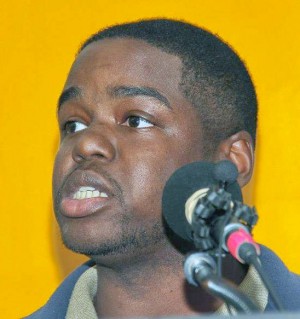Baltimore community groups sue to stop school closing
Community organizations in Baltimore have opened a struggle to keep a high school open in defiance of the city school authorities. The high school, Northwestern, serves a large number of African-American and Latino/a youth in the city, and has graduated some of the top political and social leaders in Maryland.
This struggle joins the Baltimore community groups with those in 15 other U.S. cities and towns. This is part of a national effort to maintain and improve educational standards for the most oppressed and poorly served sectors of the working class.
One of the leaders of this effort was in New York on Feb. 23, speaking at a Black History Month public meeting at the newly relocated Solidarity Center. The Rev. Cortly “C. D.” Witherspoon, president of the local Southern Christian Leadership Conference and an initiator of the Baltimore People’s Power Assembly, explained the background of the struggle to keep Northwestern open. Both the SCLC and the Baltimore PPA are a part of this struggle.
Northwest Baltimore is an affluent neighborhood, but the Northwestern High School student body is 95 percent African American and is generally far from affluent. “There is a history of racist incidents involving people in the community attacking Black high school students,” said Witherspoon. “CEO Andres Alonso, of the Baltimore public schools, wants to grab the high school and shut it down.”
Claiming a need to save on expenses, the school authorities hired the Jacobs Project Management Co. to examine the costs necessary to repair the school buildings. This study showed it would take $48 million to do the repairs. The school board claimed this high cost of renovation was not cost effective, and used these findings as its pretext for attempting to shut the school down.
Official study distorted costs
The Alumni Association of Northwestern High contested this with its own study, which found many of the “repairs” Jacobs reported either were fallacious or had already been done.
The alumni association’s lawsuit says that the Jacobs evaluation neglected to consider renovations the school was slated to undergo months after the study was done. In the summer of 2012, for example, upgrades were already made to the bleachers and tennis courts. The Jacobs study also falsely identified “wardrobe storage cabinets” as needing replacement, although there are no such cabinets in the school. (Baltimore Sun, Feb. 22)
The suit also argues that if the school were closed, students from the eight middle schools that now feed into Northwestern would not have access to adequate high school resources.
Northwestern, which has graduated past Baltimore mayors, Maryland legislators and other public officials, is the only high school among 11 other schools named to be closed.
It wasn’t easy to open the legal aspect of this struggle, said Witherspoon. “[The alumni association] couldn’t find an attorney in Baltimore and even in all of Maryland willing to work on the effort. But they found one in Virginia who was able to prepare a legal brief bringing to light the real costs involved and demanding a stop on the closing. The SCLC and PPA have joined the suit to win an injunction.”
The SCLC also plans to file a civil rights complaint under Title VI, which invokes the Civil Rights Act of 1964. Title VI prohibits discrimination in federally funded programs.
Since the closing disproportionately affects African-American and Latino/a communities, the alumni association and other civil rights activists consider it to be discriminatory, violating the rights of people of color and other low-income sectors of the population.
“We networked and found that there were other organizations around the country involved in similar struggles using Title VI,” Witherspoon reported. In 15 other cities, all the public schools slated to be closed were ones serving mainly African- American and Latino/a students. “Now Baltimore is the 16th such city,” he noted.
Witherspoon said that the community organizations want a moratorium on all school closings. He pointed out that the school authorities consulted with no community, student or parent organizations and tried to purposely close Northwestern for reasons that had nothing to do with its obligation to provide adequate education to the Black, Latino/a and other working-class youth of Baltimore.


